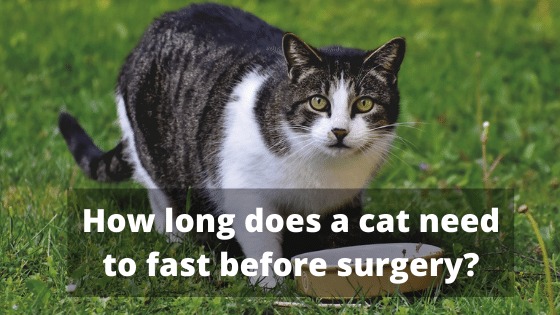Cat fasting before surgery
To see your cat in a hospital before they have to go through surgery is a difficult phase to go through, be it a planned or unplanned surgery. Not much can be done if the surgery is unplanned. However, there are certainly steps you should take if your cat has a planned surgery.
We are frequently asked about cat fasting before surgery. We strongly recommend a fasting schedule for your cat if they have an upcoming surgery.
If you are wondering how long does a cat need to fast before surgery, read below.
How long does a cat need to fast before surgery?
The use of anesthesia and drugs can make your cat vomit, and to avoid this type of situation, most vets prescribe a certain fasting period. How long your cat needs to fast before surgery is mostly dependent on their age.
How many hours before surgery should a cat not eat?
Certain hospitals have recommended fasting of four to six hours if the cat is 6 – 16 weeks. However, for cats that are older than 16 weeks, it is highly recommend that your cat fasts during the entire day leading up to the surgery. It is safe to say that around 8 to 12 hours of fasting is essential before your cat has a surgery.
The amount of time your cat has to fast is also dependent on the operation. For example, a quick routine surgery like a cat spay incision may only require a couple hours of fasting.
What happens if your cat doesn’t fast before surgery?
Before getting into the surgery, your pet cat can be moved around a lot. Whether it be it for X rays, or moving them from their bed to the surgery table. This can cause your cat to get really nervous, and in the worst cases, nauseous. If your pet has recently eaten, your pet might start vomiting.
Studies:
Recent research has shown that to reduce the risk of any complications, it is best to make your pet stop eating 8-12 hours before the surgery. If you are not able to follow the schedule, make sure to notify your vet. Then, your vet might be able to adjust the surgery time according to the time your cat has started fasting. You may give your cat some water throughout the night after consulting with your vet, but your cat should consume no solid food.
Cats with diabetes and other conditions:
However, the situation can change if you have an elderly cat or a cat with other health conditions like diabetes. In these situations, it is hard for the cat to go through 12 hours without eating. If this is the case for your cat, it is essential to consult your vet and ask for the appropriate amount of fasting before the surgery. We also recommend that you close all the windows and refrain your cat from roaming outside.
Conclusion:
Having your little furry friend go through surgery is a big deal that should not be taken lightly. It is essential to have every prepared as best as possible. It is important to always follow your cat’s prescribed fasting schedule before our cat must undergo a surgery.
If your cat is getting spayed, I recommend checking out this article to see how long to keep a cat confined after spay.

